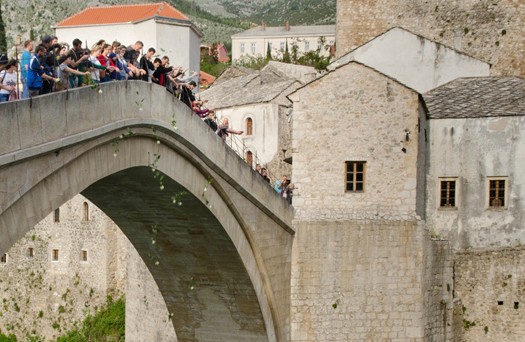In an unprecedented act of unity, youth activists from across Bosnia and Herzegovina united to visit sites of former detention camps and pay respect to victims from all ethnic groups and sides of the conflict.
Some 50 activists of the initiative “Because It Matters” from Prijedor, Banja Luka, Mostar, Tuzla, Sarajevo, Ljubuski, Gradiska, Konjic and other cities visited locations in Hadzici, Celebici, Jablanica, and Dretelj, where crimes were committed against civilians of Bosniak, Serb, and Croat ethnicities.
Bosnia and Herzegovina suffered a vicious conflict in the early 1990s, in which more than 100,000 people were killed, thousands of women were systematically raped, torture and killings were committed in numerous concentration camps, and over a million people were expelled from their homes.
The country still remains deeply divided along ethnic lines and this is the first time since the war ended in 1995 that an act of remembrance brought together youth from Serb, Bosniak, and Croat communities to mark the suffering of victims from all three groups. The locations of the former detention facilities line the route travelled each year by many Bosnians who vacation on the coast. The act aimed to draw attention to the plight of survivors and families of victims, often used by various political actors to deepen mistrust between communities.
"We believe that all civilian victims of the war are our victims, our people,” said Mirna Kusturica, an activist from Sarajevo. “It is high time to stop the instrumentalization of people’s suffering, to stop manipulation of victims for political purposes and for maintaining the existing divisions. They were all citizens of our country and we want to honor them all equally. Our goal is to ensure that victims’ basic human rights are respected on the entire territory of Bosnia and Herzegovina, regardless of their ethnicity. With this act, we send a clear message to Bosnian society that we reject denial of crimes, discrimination, and politicization of victims.”
At each site, activists read testimonies of survivors and held one minute of silence for those killed. Nikola Kuridža, an activist from Prijedor, a town in the Serb-dominated part of Bosnia, read a testimony of a Bosniak detained in Hadzici. "My voice trembled. Although I knew what took place in the camps we visited, to be in these places where innocent people were tortured and killed was a very difficult experience for me.”
After paying respect to the victims in the Dretelj camp, activists visited Mostar’s famous Old Bridge, which was destroyed in the war but rebuilt in recent years. In a symbolic act they threw hundreds of white roses in the Neretva River below to honor all the civilian victims of the war.
Learn more about transitional justice and ICTJ's work in The former Yugoslavia. PHOTO: Youth activists atop the Old Bridge in Mostar throw hundreds of white roses into Neretva River as part of a unified effort to commemorate victims of all ethnicities (Abrasmedia)
